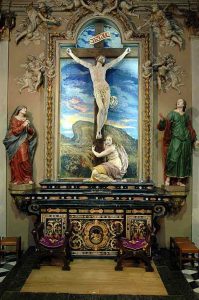

Blessed Antonio Rosmini, born in Rovereto, near Trent, on 24th March 1797, was ordained priest in 1821, and founded the Institute of Charity on 20th February 1828, at Sacro Monte Calvario, Domodossola, in the Diocese of Novara. The date marked the birth of the Institute of Charity. Rosmini remembered the prophecy made to him years earlier by the Countess Maddalena of Canossa, “I wish the Sons of Charity to be born between JESUS on the Cross and His sorrowful Mother”: the shrine at Calvario had at the back of the main altar the powerful statues of Christ on the Cross and of His sorrowful Mother.
The Constitutions received the formal approval of the Church on 20th December 1838. Rosmini was already known for his writings on spirituality, philosophy, theology, education and politics. His authoritative figure and the freshness of his charism were very much appreciated, and soon schools and parishes were committed to his care. In 1835, he sent missionaries to England.
Universal Charity
The fundamental characteristics of his spiritual and apostolic charism consists in living to the full universal charity. Rosmini saw this as having three forms: temporal, intellectual, and spiritual. To achieve this, he remained fully open to doing the Will of God in all things. He dedicated his life to making JESUS Christ known, He who is the Truth, in complete fidelity to the Magisterium of the Church.
Spiritual charity, the highest of the three, concerns the pastoral and spiritual care of souls in parishes, retreat centres, and in missionary work. Intellectual charity is pursued by means of education in schools, colleges and universities. Temporal charity deals with a wide range of personal need and embraces the sick, the poor, and the marginalised.
The Pope’s invitation to write books to present, in a modern language, the doctrine of the Church was accomplished by publishing works that were destined to produce fruits well into the future. His prodigious activity in many fields was supported by a mystical life of prayer, which included the daily offering of his blood in union with the precious Blood of JESUS. On 18th November 2007, he was proclaimed a Blessed, and was presented as a luminous model of intellectual charity.
In his exhortation, Veritatis Gaudium of 29th January 2018, Pope Francis, quoting words from the book The Five Wounds of Holy Church, published by Rosmini in 1848, issued an invitation to follow Rosmini’s recommendations for the formation of clergy and of the faithful.
The fundamental dimensions of the charism
The Institute, as a religious family born of Charity, offers God’s help for sanctification in the perfection of charity. It is a gift for all categories of people, because God does not exclude anyone from His love. In practice, the following groups belong to the Institute: brothers and priests with vows (Rosminians), the Sisters of Providence (Rosminian Sisters), Adopted Sons and Ascribed members. These latter do not live in communities but participate in the charism while following their chosen way of life. They can be men and women, married couples, diocesan priests, an even bishops!
Rosmini did not receive from God a call to any specific work of charity, like many other founders, and thus the Institute is meant to mirror the Church in its identity and in its mission of universal charity. The development of our charism has been conditioned and slowed down by historical and ecclesial events, but in recent years it has begun to increase.
The fundamental dimensions of the spirituality of our charism
Union with God begins with justice, that is, with the commitment to personal purification and detachment from sin. It grows into adherence to grace in such a way that we desire only, and in an orderly fashion, to do the will of God, manifested through the duties of our state of life, the voice of the Church, the indications of superiors, and the demands of our neighbours. All this is masterly expressed in the pages of Maxims of Christian Perfection. Since Rosmini affirms the supreme value of the person, the Rosminian way enhances and directs a conscious and mature Christian witness.
